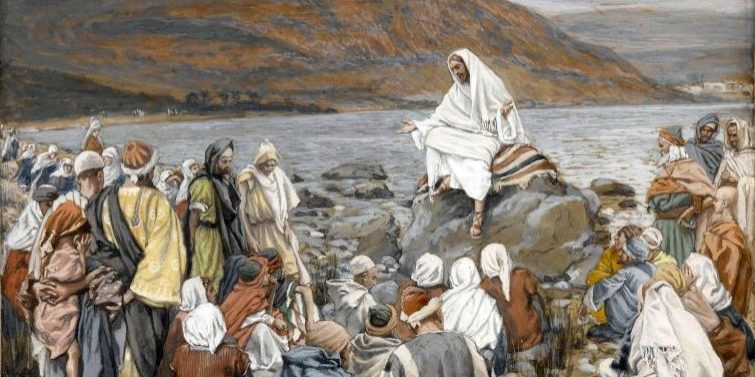
Jesus and Solus Christus
Luke 24:45-48 says, “Then he opened their minds to understand the Scriptures, and said to them, ‘Thus it is written, that the Christ should suffer and on the third day rise from the dead, and that repentance and forgiveness of sins should be proclaimed in his name to all nations, beginning from Jerusalem. You are witnesses of these things.’”
It’s clear from my post on “The Apostles and Sola Scriptura” that the OT proclaimed Christ’s suffering and resurrection. But on the third day, specifically? Where’s that? There are really only two places—Jonah’s third-day rise from the whale, and Hosea 6:1-2: “Come, let us return to the Lord; for he has torn us, that he may heal us; he has struck us down, and he will bind us up. After two days he will revive us; on the third day he will raise us up, that we may live before Him.” In the original context, that was a passage about the judgment and restoration of Israel; but Jesus thinks it testifies to Himself as True Israel, judged for our sins and raised for our justification. What that implies, though, is that Jesus sees the whole history of Israel’s judgment and restoration, the overarching theme of exile and return, as pointing to His own representative, eschatological death and resurrection. It is this dominical hermeneutic that serves as the foundation for the apostolic interpretive model that we found employed in Acts (cf. Mt 12:41-42; Luke 5:33-39; Jn 5:39, 46).
We see Matthew explaining Jesus’ parabolic teaching method as an application of the same interpretive model in Matthew 13:34-35: “All these things Jesus said to the crowds in parables; indeed, he said nothing to them without a parable. This was to fulfill what was spoken by the prophet: I will open my mouth in parables; I will utter what has been hidden since the foundation of the world.” All these things Jesus said in parables were things about God’s kingdom being established in His own arrival in Matthew 13. And he speaks those kingdom truths in parable form, Matthew says, in order to fulfill Psalm 78:2.
“Well,” we say, “how cool is that! There’s an obscure verse in Psalm 78 where Asaph teaches in parables, and lo and behold, Jesus teaches that way too. Hallelujah!” But our Hallelujah rings hollow unless we understand the whole of Psalm 78 and Jesus’ relationship to it. Psalm 78:2 introduces Israel’s history from exodus to establishment of David’s kingdom. Asaph introduces that history as a parable in itself. “I will open my mouth in a parable,” and the parable that comes out of his mouth is the living history of disobedient Israel that terminates on King David who “with upright heart shepherded them and guided them with his skillful hand.” Israel’s history, from exodus to established kingdom, is the parable the psalmist spoke. Even for Asaph, then, Israel’s real-life history is a parable of something else. For Asaph, Israel’s history from exodus to united kingdom was a living parable about the need to obey God in the land better than they did in the wilderness—to borrow a phrase from Gordon Wenham, Story as Torah, “so that they should set their hope in God and not forget the works of God, but keep his commandments; and that they should not be like their fathers, a stubborn and rebellious generation…”
For Matthew, though, Israel’s history in Psalm 78 is a parable of how God’s kingdom would come about in Jesus’ life, death, and resurrection. The parable of Psalm 78 explained how David’s kingdom came. The parables of Matthew 13 explains how Jesus’ kingdom comes; and it comes as the fulfillment of David’s kingdom, as Jesus relives and fulfills Israel’s history in His life, death, and resurrection. Jesus would redeem His people in a second exodus out of slavery to sin. He would feed them on the true bread that comes down from heaven, lead them to a new Promised Land, and reign over them as the Great David’s Greater Son to live forever in the promised land of the New Creation.
We might equivocate and say that it’s “only” Matthew who’s quoting Psalm 78, not Jesus. But what Matthew is saying about Psalm 78 is that it’s Jesus’ own reason for teaching in parables. The point of Psalm 78 in Matthew 13, then, is not simply that Jesus would teach like Asaph. It’s that Jesus would become the sum and substance of Israel’s parabolic history as Asaph rehearsed it in Psalm 78. That, Scripture says, is [arguably] the greatest reason Jesus taught His kingdom in parables—because Israel’s kingdom was itself a parable that pointed to Jesus. The new element Jesus introduces, of course, is how quietly His kingdom arrives—at night, in Bethlehem; and how small it appears—Jesus and the twelve; how long it takes to grow; how authority in his kingdom operates from the bottom up; and how hidden but effective its influence will be.[1] Neither Jesus nor Matthew is simply just proof-texting for a heuristic. They are both authorizing a hermeneutic. Jesus’ parables show how He Himself brings Israel’s history to its true fulfillment, and how we not only can but should do the same thing from any other part of the OT witness (cf. Isa 65:17; Jer 23:7). Jesus’ parables show how He Himself brings Israel’s history to its true fulfillment Click To Tweet
Conclusion
But can this really be right? Surely we’re over-reaching. Are we really allowed to do this, even with OT passages that neither Jesus nor the apostles mention? It’s not a question of permission, but of obedience. Scripture teaches us how to interpret itself, and if Scripture cannot be broken, then neither can the apostolic hermeneutic that produced it.
Pastorally, if the apostles see the key of the OT as Christ, then to neglect that method in our preaching is to withhold the key of knowledge from our listeners (Lk 11:52).[2] The biblical writers viewed all of “history…as built upon a certain pattern corresponding to God’s design for man…. [God’s] impact on human society reveals itself negatively as judgment upon human action, positively as power of renewal, or redemption. This twofold rhythm of that pattern of history finds characteristic expression in terms of death and resurrection…[The apostles] declared that in the ministry, death, and resurrection of Jesus Christ this act of absolute judgment and absolute redemption had taken place. This complex event therefore becomes the center from which the whole history of the people of God, both backwards and forwards in time, is to be understood, and ultimately the history of all mankind. This is the assumption which underlies the application of OT prophecy to the gospel facts” (110).[3]
If you are a Christian, then whether you’re a pastor or not, Jesus is shaping your personal sufferings in life and ministry on this same mold of his own exile and return, suffering and glory, death and resurrection. How else will you make sense of your own Christian sorrows apart from this arch-type of death and new life? Moises Silva put it well: “if we refuse to pattern our exegesis after that of the apostles, we are in practice denying the authoritative character of their scriptural interpretation—and to do so is to strike at the very heart of the Christian faith.”[4] Besides, if Scripture itself doesn’t provide the pattern for our exegesis, then what in the world will?
Endnotes
[1] D.A. Carson draws hermeneutical conclusions: “Asaph claims to be explaining…earlier patterns in redemptive history; but in so doing, from a NT perspective he is also himself becoming a constituent element of the recorded redemptive history the NT explains. As such Psalm 78 becomes part of the ‘Law and Prophets’ that prophesy. If part of this sacred record interprets and brings new truth out of an earlier part, it establishes a pattern that looks to one who will interpret and bring new truth out of the whole. Jesus, Matthew claims, fulfills that role and is exercising it in his own parabolic teaching” (EBC, 8:323; but R.T. France disagrees, NICNT, 530 n.6).
[2] Patrick Fairbairn, Typology of Scripture (Grand Rapids: Kregel reprint, 1989), 1:20. He also argues that searching out typologies in addition to those specified by the NT authors needs no inspiration since Jesus expected the apostles to have figured it out before Pentecost in Lk 24, since Heb 5:11-14 rebukes the church at large for their ignorance of Melchizedek, and since the myriad examples that are mentioned “as selected merely on account of their suitableness to the immediate end in view [such] that they cannot fairly be regarded otherwise than as specimens of the class they belong to. And if so, they should rather have the effect of prompting further inquiry than of repressing it, since…they only exhibit practically the principles on which others…are to be discovered and explained” (1:21, 23).
[3] Dodd, 129-130. He goes on to speak of the apostolic hermeneutic as an “organic outgrowth or ripening of the original [OT] thought” (133).
[4] Quoted in G.K. Beale, ed. The Right Doctrine from the Wrong Text? (Grand Rapids: Baker, 1994), 404.

